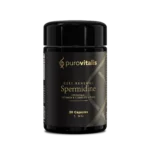
Gli integratori per la longevità hanno invaso il mercato e, grazie alla crescente ricerca, sono al centro dell'attenzione. Tuttavia, come consumatore finale, la paura degli effetti collaterali dell'assunzione di questi integratori incombe sempre. La spermidina, ad esempio, è un integratore per la longevità molto popolare e sembra una scelta eccellente per migliorare la salute e invecchiare in modo sano. Tra gli altri benefici, induce l'autofagia, un processo attraverso il quale il corpo degrada o elimina le cellule vecchie e danneggiate (1). L'autofagia è fondamentale per la longevità. Purtroppo, il suo tasso diminuisce con l'avanzare dell'età (2).
Tuttavia, come per ogni prodotto che si consuma, è essenziale verificare se la spermidina ha effetti collaterali. Questo ti farà grattare la testa perché su internet tutti sembrano parlare solo dei benefici e tralasciano questo aspetto cruciale. Potresti aver sentito parlare della tossicità delle poliammine, che potrebbe causare problemi al cervello, al fegato e ai reni. (3). Non c'è da stupirsi che tu ti senta esausto e sia qui a cercare informazioni affidabili.
Diamo un'occhiata alle ricerche per capire se la spermidina è sicura e se ha effetti collaterali.
La Spermidina è sicura da assumere?
Prima di tutto, la spermidina è sicura da assumere? La risposta breve è sì. Alla dose giornaliera raccomandata di circa 5-10 mg, gli integratori di spermidina sono una sostanza estremamente sicura, con un'eccellente tollerabilità e senza effetti avversi noti fino ad oggi. Il motivo è che la spermidina viene prodotta naturalmente dal corpo umano e si trova anche negli alimenti che mangiamo. Pertanto, il nostro corpo non solo ha bisogno di poliammine per mantenersi in salute, ma è anche ben adattato a questi composti. Inoltre, anche la ricerca supporta queste affermazioni.
Ad esempio, uno studio del 1997 condotto su topi di laboratorio ha rivelato che la spermidina ha mostrato alcuni effetti negativi. A dosi di circa 600mg/kg di peso corporeo, un valore estremamente elevato rispetto alla dose giornaliera tipica. Tuttavia, a questa dose più elevata, la spermidina ha iniziato a mostrare segni di tossicità, come una diminuzione dell'appetito, del peso e dei livelli ematici di calcio e potassio nei topi maschi e un aumento dell'attività plasmatica dell'aspartato aminotransferasi e dell'alanina aminotransferasi, due enzimi utilizzati per valutare la funzionalità epatica (5).
Inoltre, uno studio del 2018 ha valutato la tossicità della spermina e della spermidina presenti negli alimenti nei confronti delle cellule intestinali. I ricercatori hanno scoperto che mentre entrambe le poliammine non sono tossiche per l'intestino a dosi normali trovate negli alimenti, a dosi molto elevate (1,5 g/kg di peso corporeo) inducono la morte delle cellule intestinali (6). Tuttavia, i ricercatori affermano che a questi livelli la spermina è più tossica della spermidina (circa 5,5 volte più tossica).
Studio di sicurezza per la Spermidina sull'uomo
Oltre a questi studi di laboratorio, anche la ricerca sugli esseri umani è promettente. Ad esempio, uno studio del 2018 che ha coinvolto 30 partecipanti umani ha dimostrato che l'assunzione di un estratto di germe di grano ricco di spermidina per tre mesi non ha causato alcun disturbo del peso, degli elettroliti, dei parametri ematici di sicurezza e della pressione sanguigna o di altri segni vitali (7). Al contrario, lo studio ha dimostrato che la spermidina ha migliorato le funzioni cognitive dei partecipanti anziani. Lo stesso studio è stato condotto su topi di laboratorio e ha dato risultati simili.
Inoltre, l'Unione Europea ha già approvato alimenti ricchi di spermidina come l'estratto di germe di grano, che è diventato molto popolare tra i consumatori. Con il passare del tempo e con l'aumentare delle ricerche a sostegno delle affermazioni degli integratori per la longevità, la spermidina non potrà che aumentare la sua popolarità. Nel frattempo, però, una cosa è certa: la spermidina è una poliammina estremamente sicura e dall'ottima tollerabilità. E come per ogni veleno, è sempre la dose a essere velenosa piuttosto che il composto stesso
Spermidina vs altre poliammine
L'idea sbagliata che la spermidina abbia effetti collaterali deriva dal fatto che si tratta di un'ammina biogena, ossia di composti con uno o più gruppi amminici che si formano come prodotti di decarbossilazione degli amminoacidi. I primi ricercatori pensavano che, come altre ammine biogene come la tiramina, l'istamina, la cadaverina, la feniletilamina e la triptamina, anche la spermidina e altre poliammine avrebbero avuto effetti collaterali (8). Alcuni degli effetti collaterali di queste amine biogene possono essere mal di testa, palpitazioni, vomito, diarrea, allergie e crisi ipertensive (9).
Conclusione
Come già detto, la spermidina è diversa da altri composti biogeni. Non induce stress ossidativo nell'organismo e, di conseguenza, non causa problemi di salute. La spermidina non ha effetti collaterali noti fino ad oggi, nemmeno a dosi molto elevate. Al contrario, apporta benefici all'organismo in molti modi diversi, tra cui agisce come antinfiammatorio e induce l'autofagia per contribuire a prolungare la durata della vita di un individuo. Pertanto, è altamente improbabile che gli integratori di spermidina causino effetti collaterali.
Riferimenti:
https://pmc.ncbi.nlm.nih.gov/articles/PMC6287690
https://pmc.ncbi.nlm.nih.gov/articles/PMC6333684
https://pubmed.ncbi.nlm.nih.gov/9207896
https://www.sciencedirect.com/science/article/abs/pii/S0308814618311336

Fusione di spermidina supporto all'autofagia Consegna liposomiale
Regola il processo di pulizia naturale del suo corpo! Lo provi!













